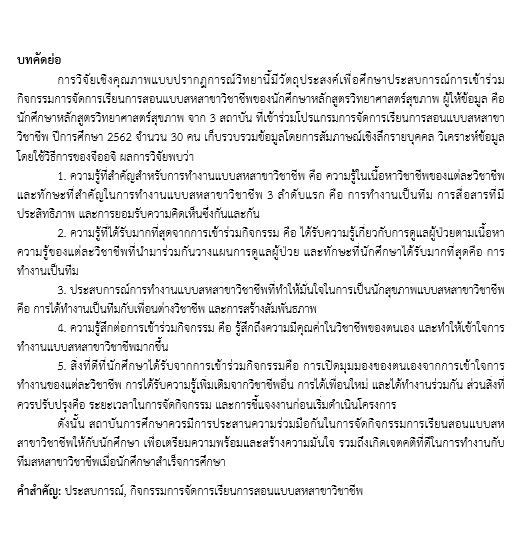ประสบการณ์ของนักศึกษาที่เข้าร่วมกิจกรรมการจัดการเรียนการสอนแบบสหสาขาวิชาชีพ: การวิจัยเชิงคุณภาพ
คำสำคัญ:
ประสบการณ์, กิจกรรมการจัดการเรียนการสอนแบบสหสาขาวิชาชีพบทคัดย่อ
การวิจัยเชิงคุณภาพแบบปรากฎการณ์วิทยานี้มีวัตถุประสงค์เพื่อศึกษาประสบการณ์การเข้าร่วมกิจกรรมการจัดการเรียนการสอนแบบสหสาขาวิชาชีพของนักศึกษาหลักสูตรวิทยาศาสตร์สุขภาพ ผู้ให้ข้อมูล คือ นักศึกษาหลักสูตรวิทยาศาสตร์สุขภาพ จาก 3 สถาบัน ที่เข้าร่วมโปรแกรมการจัดการเรียนการสอนแบบสหสาขาวิชาชีพ ปีการศึกษา 2562 จำนวน 30 คน เก็บรวบรวมข้อมูลโดยการสัมภาษณ์เชิงลึกรายบุคคล วิเคราะห์ข้อมูลโดยใช้วิธีการของจีออจิ ผลการวิจัยพบว่า
1. ความรู้ที่สำคัญสำหรับการทำงานแบบสหสาขาวิชาชีพ คือ ความรู้ในเนื้อหาวิชาชีพของแต่ละวิชาชีพ และทักษะที่สำคัญในการทำงานแบบสหสาขาวิชาชีพ 3 ลำดับแรก คือ การทำงานเป็นทีม การสื่อสารที่มีประสิทธิภาพ และการยอมรับความคิดเห็นซึ่งกันและกัน
2. ความรู้ที่ได้รับมากที่สุดจากการเข้าร่วมกิจกรรม คือ ได้รับความรู้เกี่ยวกับการดูแลผู้ป่วยตามเนื้อหาความรู้ของแต่ละวิชาชีพที่นำมาร่วมกันวางแผนการดูแลผู้ป่วย และทักษะที่นักศึกษาได้รับมากที่สุดคือ การทำงานเป็นทีม
3. ประสบการณ์การทำงานแบบสหสาขาวิชาชีพที่ทำให้มั่นใจในการเป็นนักสุขภาพแบบสหสาขาวิชาชีพ คือ การได้ทำงานเป็นทีมกับเพื่อนต่างวิชาชีพ และการสร้างสัมพันธภาพ
4. ความรู้สึกต่อการเข้าร่วมกิจกรรม คือ รู้สึกถึงความมีคุณค่าในวิชาชีพของตนเอง และทำให้เข้าใจการทำงานแบบสหสาขาวิชาชีพมากขึ้น
5. สิ่งที่ดีที่นักศึกษาได้รับจากการเข้าร่วมกิจกรรมคือ การเปิดมุมมองของตนเองจากการเข้าใจการ ทำงานของแต่ละวิชาชีพ การได้รับความรู้เพิ่มเติมจากวิชาชีพอื่น การได้เพื่อนใหม่ และได้ทำงานร่วมกัน ส่วนสิ่งที่ควรปรับปรุงคือ ระยะเวลาในการจัดกิจกรรม และการชี้แจงงานก่อนเริ่มดำเนินโครงการ
ดังนั้น สถาบันการศึกษาควรมีการประสานความร่วมมือกันในการจัดกิจกรรมการเรียนสอนแบบสหสาขาวิชาชีพให้กับนักศึกษา เพื่อเตรียมความพร้อมและสร้างความมั่นใจ รวมถึงเกิดเจตคติที่ดีในการทำงานกับทีมสหสาขาวิชาชีพเมื่อนักศึกษาสำเร็จการศึกษา
เอกสารอ้างอิง
Buring, S. M., Bhushan A., Broeseker, A., Conway, S., Duncan-Hewitt, W., Hansen, L., et al. (2009). Interprofessional Education: Definitions, Student Competencies, and Guidelines for Implementation. American Journal of Pharmaceutical Education, 73(4), 1-8.
Chareonwongsak, K. (2016). Future Forward of Thailand Education in Thailand 4.0. Retrieved April, 5, 2020 from http://www.li.mahidol.ac.th/conference2016/thailand4.pdf. (in Thai).
Chuenkongkaew, W., (2018). Interprofessional Education. Nonthaburi: The National Health Professional Education Foundation. (in Thai).
Hammick, M., Freeth, D., Koppel, I., Reeves, S., & Barr, H. (2007). A Best Evidence Systematic Review of Interprofessional Education: BEME Guide no. 9. Medical Teacher, 29(8), 735-751.
Homeyer, S., Hoffmann, W., Hingst, P., Oppermann, R., & Dreier-Wolfgramm, A. (2018). Effects of Interprofessional Education for Medical and Nursing Students: Enablers, Barriers and Expectation for Optimizing Future Interprofessional Collaboration – a Qualitative Study. BMC Nursing, 17(1), 1-10.
Kenaszchuk, C., Rykhoff, M., Collins, L., McPhail, S., & Van Soeren, M. (2012). Positive and Null Effects of Interprofessional Education on Attitudes Toward Interprofessional Learning and Collaboration. Advances Health Sciences Education Theory Practice Journal, 17(5), 651-669.
Plodpluang, A. (2013). Data Analysis in Phenomenology Studies. Nursing Journal of the Ministry of Public Health, 23(2), 1-10.
Reeves, S., Fletcher, S., Barr, H., Birch, I., Boet, S., Davies, N., et al. (2016). A BEME Systematic Review of the Effects of Interprofessional Education: BEME Guide No. 39. Medical Teacher, 38(7), 656-668.
Rukrung, K., Rukrung, K., Thaanchan, K., Ketsakun, K., Natewong, K., Phok Phiphat, K., et.al. (2018). Readiness for Interprofessional Learning of Sophomore and Junior Nursing students at Boromarajonani College of Nursing, Suratthani. Active Learning National Conference, the 6th. Walailuk University. (in Thai).
Sarakshetrin, A., Sriyasak, A., Ketin, V., & Rongmuang, D. (2019). A Development of Interprofessional Education Learning Model for Health Promotion among the Elderly in the Community. Journal of Health and Nursing Research, 35(2), 140-152. (in Thai).
Senadisai, S., & Prapaipanich, W. (2011). Fundamental of Nursing: Concepts and Practice. Bangkok: Judthong CO.LTD. (in Thai).
Sethasathien, S. (2015). A Model of Interprofessional Education (IPE) in Department of Physical Medicine and Rehabilitation, Udonthani Hospital. Journal of Thai Rehabilitation Medicine, 25(2), 65-70. (in Thai).
Suwanjaroen, J., Sarakshetrin, A., & Malai, C. (2017). Teaching Models to Enhance the 21st Century Skills for Bachelor’s Degree Nursing Students. Nursing Journal, 44(4), 177-188. (in Thai)
Tanglakmankhong, K., Khammathit, A., Thammawongsa, N., & Ardpara, A. (2562). The Effectiveness of the Nursing Innovation Course, Using Transprofessional Education Approach on Readiness for Transprofessional Skill and the 21st Century Skill. The Southern College Network Journal of Nursing and Public Health, 6(2), 126-139. (in Thai)
The Curriculum Committee. (2019). The Interprofessional Education Curriculum for Health Sciences Students. Phitsanulok: Sirindhorn College of Public Health, Phitsanulok. (in Thai)
The National Health Professional Education Foundation. (2010). Interprofessional Education-IPE. Retrieved April, 1, 2020 from https://www.pharmacy.mahidol.ac.th/newsfile/ depdocument/pdf. (in Thai)
World Health Organization. (2010). Health Professions Networks Nursing & Midwifery Human Resources for Health: Framework for Action on Interprofessional Education & Collaborative Practice. Switzerland: Monkeytree Creative Inc.
Yuenyow, T., Howharn, C., & Promsuan, W. (2019). Effects of Interprofessional Education on Perception on Interprofessional Roles and Responsibility, and Teamwork. Journal of Nursing, Public Health, and Education, 20(1), 137-147. (in Thai)

ดาวน์โหลด
เผยแพร่แล้ว
ฉบับ
ประเภทบทความ
สัญญาอนุญาต
1. บทความหรือข้อคิดเห็นใด ๆ ที่ปรากฏในวารสารเครือข่าย วิทยาลัยพยาบาลและการสาธารณสุขภาคใต้ ที่เป็นวรรณกรรมของผู้เขียน บรรณาธิการหรือเครือข่ายวิทยาลัยพยาบาลและวิทยาลัยการสาธารณสุขภาคใต้ ไม่จำเป็นต้องเห็นด้วย
2. บทความที่ได้รับการตีพิมพ์ถือเป็นลิขสิทธิ์ของ วารสารเครือข่ายวิทยาลัยพยาบาลและการสาธารณสุขภาคใต้







